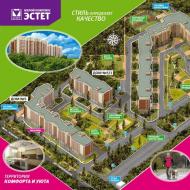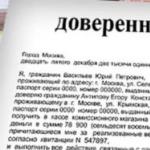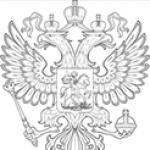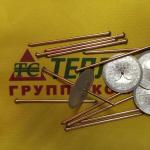
Operations related to movement of capital. Currency transactions related to the movement of capital. Currency operations of capital and their impact on the accounting statements of the authorized bank
"Financial newspaper. Regional edition", N 50, 2001
According to the law Russian Federation from 09.10.1992 N 3615-1 "On currency regulation and currency control"(as amended from 31.05.2001 N 72-ФЗ) All foreign exchange operations are divided into two groups: current currency transactions and operations related to capital movement (capital operations). The current foreign exchange transactions include those contained in the closed list ( P.9 of Article 1 of the Law); The list of operations related to the movement of capital is open - to this category of foreign exchange operations include other transactions that are not included in the current list.
A clear distinction of current and capital currency transactions is practical for accountants and financial employees, since the implementation of these operations is different. In accordance with the current law, current currency transactions can be carried out by enterprises and organizations in free mode (ie, without restrictions), but within the framework of the current currency legislation of the Russian Federation, and the procedure for making capital operations is established by the Bank of Russia.
Consider the procedure for carrying out operations related to the movement of capital, determined by the Bank of Russia.
Before the adoption of the Law of the Russian Federation "On Currency Regulation and Currency Control" on the territory of the Russian Federation operated a letter of state bank of the USSR from 24.05.1991 N 352 "The main provisions on the regulation of currency transactions in the USSR". In relation to operations related to the movement of capital, this document was established by permits: for their implementation, it was necessary to first obtain a license of the State Bank of the USSR or the central banks of the republics for each specific operation.
After the adoption of the Law of the Russian Federation "On Currency Regulation and Currency Control", the Bank of Russia confirmed the action of the mentioned letter of the State Bank of the USSR in the territory of the Russian Federation in a part not contrary to this law, as well as otherwise legislative acts and published in accordance with the instructions of the Bank of Russia. Insofar as this law It does not establish a specific procedure for making capital operations, and other legislative acts on this issue and instructions of the Bank of Russia at that time did not exist, then confirmation by the Bank of Russia Actions on the territory of the Russian Federation Letters of the State Bank of the USSR N 352 meant confirmation of the procedure established by this letter of implementation in the Russian Federation Operations related to capital movement.
When solving the issue of issuing permission to carry out a specific currency transaction, a complex of factors is taken into account: the nature of the transaction, the feasibility of its holding, the financial situation of the organization, compliance with the currency legislation, in the implementation of foreign exchange operations, fulfillment of obligations to calculate the budget and others.
In the event of a positive decision on issuing permission, the Bank of Russia establishes certain conditions that must be complied with the Resident Organization in the implementation of the operation. for exampleA specific bank can be specified through which calculations on this operation must be made, the procedure for payments. As conditions, the requirements for obtaining a guarantee from possible losses may be indicated, on the mandatory sale of the amounts received by the foreign currency in the domestic foreign exchange market, etc.
Exceptionally permitting procedures for capital operations, it was accepted by the Bank's adoption by the Bank of Russia, the provisions of the procedure for conducting certain types of currency transactions from 24.04.1996 N 39 in the Russian Federation, which has canceled the permitting procedure for a number of capital operations. All transactions listed in this document could be committed without a special permission of the Bank of Russia.
As amended by the letter of the Bank of Russia from 03.02.1997 N 403 (recognized by the order of the Bank of Russia from 10/24/1997 N 02-469), this provision was determined by the procedure for the capital operations specified in it, until changes and additions were made to the provision of the Bank of Russia from 17.09.2001 N 152-p. The name of the document is now the following edition: "On the procedure for conducting certain types of currency transactions in the Russian Federation and regarding reporting on certain types of currency transactions in the Russian Federation. Taking into account changes made to the document and additions at present, operations related to the movement of capital have the following features.
- Explore the circle carried out in the free mode of currency transactions related to the acquisition and rental of movable and real estate. Thus, residents can translate foreign currency from the Russian Federation in the order of advance payments and prepayments - to import air, maritime courts, internal swimming vessels and space facilities, provided that during the period not exceeding one year from the date of the translation of foreign currency funds, these objects Resident will be transferred.
When leased by residents from non-residents and non-residents from residents of air, sea ships, internal swimming vessels, space objects and space infrastructure facilities, as well as any movable inadequate property (with the exception of securities), foreign currency may be freely translated from the Russian Federation and to the Russian Federation at Conditions that no later than 180 days, respectively, from the date of translation of foreign currency from Russia or its receipt, the listed objects will be transferred to the tenant (respectively to the resident or non-resident). At the same time, the lease term does not matter.
Similarly, in free mode, foreign currency transfers can be carried out in favor of resident legal entities to pay in the Russian Federation of real estate recognized by those under the legislation of the Russian Federation, which is transferred to the ownership of non-residents under the contract of purchase and sale or other transactions on the alienation of this property. .
If immovable property (except for air, ships, internal swimming vessels, space objects and space infrastructure facilities), recognized by those under the legislation of the Russian Federation and located on the territory of the Russian Federation are transmitted to non-residents for rent, then transfers of foreign currency by non-residents in favor of legal entities - Residents as a rent for leased property are also carried out in a free order.
Without permission of the Bank of Russia, the residents and non-residents listed by the advances and prepayments, the deposit of unfulfilled agreements listed by them, erroneously listed amounts.
- Operations, the implementation of which does not require the permission of the Bank of Russia, the operations related to the receipt of residents and non-resident loans in foreign currency from authorized banks for a period exceeding 180 days, on the basis of prisoners with authorized banks of loan agreements, as well as refund operations Authorized banks received from them residents and non-resident loans in foreign currency, including interest on them and a penalty for non-fulfillment or improper fulfillment of obligations under loan agreements.
If in ensuring the execution of its obligations under credit Treaty The debtor has concluded a contract of guarantee with the resident, then the resident - the guarantor without permission of the Bank of Russia can translate foreign currency in pursuance of its obligations under the guarantee agreement. Translations by residents of foreign currency in favor of non-residents in the order of execution of their obligations under the guarantee agreement in the event that the debtor - resident fulfilled or improperly performed his obligations under the loan agreement with a non-resident, are also carried out in free mode.
If the debtor is as collaborated by the debtor, the resident submits the authorized bank to the pledge of securities nominated in foreign currency, and they are evaluated in accordance with the legislation of the Russian Federation, then the Bank of Russia is not required for sale and buying these securities.
- Residents can buy for foreign currency by authorized banks of bills issued by these banks in foreign currency, make them to pay and receive a payment in foreign currency or in the currency of the Russian Federation.
The alienation of residents of bills to authorized banks, as discussed by these bills and other authorized banks, for foreign currency and for the currency of the Russian Federation is carried out in the manner prescribed by bill legislation.
Residents can acquire and alienate through authorized banks at the organized securities market for foreign currency issued by residents issued by emission securities nominated in foreign currency. Store the specified securities and account for rights on them can only residents can professional participants The securities market that have a license to carry out depository activities.
- The free regime of currency operations is distributed and on calculations on marine agents.
Legal entities - residents that are maritime agents on the basis of marine agency agreements concluded with shipowners - non-residents provide them with services in sea ports The Russian Federation, in payment for which shipowners - non-residents translate foreign currency to maritime agents. At the same time, maritime agents on the basis of intermediary treaties concluded by them with the shipping administrations of ports, translate them foreign currency as port fees for staying in Russian ports of foreign courts.
- Calculations related to payments in foreign currency insurance and reinsurance, both in favor of residents in the Russian Federation and in favor of non-residents from the Russian Federation, are carried out in free mode only under the condition that the contract validity period does not exceed five years from the date of its signing.
- Individuals - residents can translate abroad, including their accounts opened outside the Russian Federation in the manner established by the Bank of Russia, foreign currency not exceeding 75 thousand dollars during the calendar year, to acquire rights to valuable Paper nominated in foreign currency.
In the case of an individual - a resident of the rights to securities, the obtained foreign currency can be translated into the Russian Federation. An individual - resident can transfer securities nominated in foreign currency under the contract of donation. Moreover, individuals Residents can translate foreign currency from the Russian Federation to their accounts opened in foreign banks in the manner established by the Bank of Russia, as well as with their accounts in foreign banks in the Russian Federation.
Do not require permission translation of individuals in foreign currency from the Russian Federation in favor of non-residents whose activities are related to the implementation of the individuals of goods in retail, fulfilling the work, the provision of services, payment for goods, works, services purchased from these non-residents.
Individuals - residents and non-residents can buy foreign currency through authorized banks at the expense of the Russian Federation at the expense of funds on their ruble accounts in credit institutions, as well as sell a foreign currency from bank accounts in foreign currency discovered in their name in authorized banks.
- Both residents and non-residents can buy and sell through authorized banks by foreign currency of one species for the foreign currency of another species, the course of which to the ruble is quoted by the Bank of Russia.
- Without permission of the Bank of Russia, transfers from the Russian Federation of foreign currency may be carried out in paying for the introductory and membership contributions to international non-governmental organizations, and the federal executive bodies - to pay for the entrance and membership contributions of the Russian Federation to international organizations, the member of which it is; Translations by non-resident foreign currency as a gift, donations in favor of residents, and in case of donations, the gift in favor of legal entities - residents can be transferred to the check, nominated in foreign currency.
From the Russian Federation, residents can translate foreign currency in favor of non-residents as payment for subscription to foreign and other periodicals.
- Non-arrival transfers, the expanded list of which is given in the position of the Bank of Russia N 152-P, are also carried out in free mode.
It should be borne in mind that all currency transactions are carried out in cashless procedure, must have a documentary confirmation (a list of supporting documents is given in the Regulation), subject to accounting in authorized banks.
When implementing individuals from individuals from the listed operations (in paragraph 8.6 of the situation), as well as operations, the amount of each of which exceeds $ 10,000, individuals must submit a certificate of tax accounting.
Capital- This is money bruised in turn and income from this turnover. Movement of currency capital means an investment investor's currency in entrepreneurial objects in order to profit.
The currency transactions associated with the movement of capital include:
a) direct investment, that is, investments in the authorized capital of the enterprise in order to extract the income and obtaining rights to participate in the management of the enterprise;
b) portfolio investment, that is, the acquisition of securities;
c) transfers to pay for ownership of buildings, structures and other property, including land and its subsoil, attributable under the legislation of its location to its location real Estate, as well as other real estate rights;
d) providing and obtaining a delay of payment for more than 90 days on export and import of goods (works, services, results of intellectual activity);
e) providing and obtaining financial loans for more than 180 days;
(e) All other currency transactions that are not current currency transactions.
Capital operations are carried out in the manner prescribed by the Bank of Russia. Currently established three modes Capital operations:
Licensed - To implement licensed operations, the resident must obtain permission (license) of the Bank of Russia to implement this operation;
Mixed - depending on the specific conditions of the transaction, the resident is obliged to either notify the Bank of Russia on its commitment, or obtain permission to implement it;
Unlicensed - such operations are carried out without the permission of the Bank of Russia.
Capital operations on export and import of works, services, results of intellectual activity, as a rule, a licensed mode is applied.
The exceptions are the operations listed in the Regulation of the Bank of Russia on the change of the procedure for conducting certain types of currency transactions in the Russian Federation of 24.04.1996 No. 39, according to which, without permission (license) of the Bank of Russia, the following operations are carried out:
The translation of the foreign currency from the Russian Federation, as well as the translation of foreign currency to the currency account, opened in the name of the non-resident in the authorized bank, to pay for the imported work produced, rendered to imported services in case of receiving the residents of the specified work performed (the relevant stage of work) rendered to the resident services regardless of the term that has passed since their reception to the date of the payment carried out by the payment;
The accrual of the resident to its currency account, open at an authorized bank in the Russian Federation, amounts to pay for goods exported to them (works, services) to customs clearance of these goods for export, receiving a non-resident work performed, services rendered, regardless of the term from the date of receipt of the payment by the payment customs clearance of goods, receiving a non-resident of the work performed, rendered services.
To determine the nature of the transactions made (determining the fact of export and import), the establishment of the place of their commission is fundamental importance. Unlike the export and import of goods in relation to services and works, as a rule, it is impossible to fix the fact of moving in space. Accordingly, there are difficulties with customs clearance fixing on the border imports or exports and, as a result, problems with the qualifications of the transaction as export or imported.
One of the most significant areas of currency legislation is regulation investment activity. The Law "On Currency Regulation and Currency Control" refers direct investment, i.e. Investments in the authorized capital of the enterprise in order to extract income and obtain rights to participate in the management of the enterprise, to currency transactions related to the movement of capital (capital operations).
According to the law to capital operations, not only investments in the authorized capital of non-resident organizations, but also Russian legal entities. At the same time, the concept of "investment in the authorized capital" by law is not disclosed, therefore, various interpretations of this provision are possible. First, there is "Wide" Interpretation, according to which any obtaining rights to participate in managing a legal entity is a capital operation. In accordance with the "narrow" interpretation of this norm by capital operation, only the translation of funds in foreign currency in payment is authorized capital A legal entity in order to extract income and at the same time obtaining rights to participate in the management of this legal entity.
Currency operations (Lat. Operato - action) are, actions on the organization and management of monetary relations arising from currency and securities in currency.
In accordance with current law (Part 1 of Art. 1 p. 9) to currency transactions include:
· Operations related to the transition of ownership and other rights to currency values (foreign currency and external securities), including operations related to the use of foreign currency payments and payment documents in foreign currency;
· Import and shipment to the Russian Federation, as well as export and shipment from the Russian Federation currency values;
· Implementation of international money transfers.
Currency transactions carry out banks with status authorized bank.
Authorized Bank - This is a bank received from Central Bank Russian Federation license for the right to conduct operations with foreign currency. Legal and individuals carrying out operations with foreign currency are subject to currency transactions in the Russia's foreign exchange market are divided into residents and non-residents.
Residents include (h. 1 Art. 1 p. 6):
a) individuals who are citizens of the Russian Federation, with the exception of citizens of the Russian Federation, recognized permanently living in a foreign country in accordance with the legislation of this state;
b) permanently residing in the Russian Federation on the basis of a residence permit provided for by the legislation of the Russian Federation, foreign citizens and stateless persons;
c) legal entities established in accordance with the legislation of the Russian Federation;
d) branches, representative offices and other divisions of the residents specified in subparagraph "B" are beyond the territory of the Russian Federation;
e) diplomatic missions, consular agencies of the Russian Federation and other official representations of the Russian Federation, located outside the territory of the Russian Federation, as well as the permanent missions of the Russian Federation for interstate or intergovernmental organizations;
e) Russian Federation, subjects of the Russian Federation, municipal memberswhich act in relations regulated by this federal law and adopted in accordance with it other federal laws and other regulatory legal acts.
Non-residents include (part 1 Art. 1 of paragraph 7):
a) individuals who are not residents in accordance with subparagraphs "A" and "B" of paragraph 6;
b) legal entities created in accordance with the legislation of foreign states and having a location outside the territory of the Russian Federation;
c) organizations that are not legal entitiescreated in accordance with the legislation of foreign states and having a location outside the territory of the Russian Federation;
d) diplomatic missions accredited in the Russian Federation, consular agencies of foreign states and the permanent representations of these states under interstate or intergovernmental organizations;
e) interstate and intergovernmental organizations, their branches and permanent missions in the Russian Federation;
e) branches on the territory of the Russian Federation, permanent missions and other separate or independent structural units non-residents specified in subparagraphs "B" and "B" of this paragraph;
g) other persons not specified in paragraph 6; the federal law "On currency regulation and currency control" from 10.12.2003 N 173-FZ Article 1 of paragraph 6 and paragraph 7
Currency transactions can be associated with both cash payments (calculations, transfers, etc.) and with capital movement (leasing, credit, etc.). Capital is money bruised in turnover and revenue from this turnover. Movement of currency capital means an investment investor's currency in entrepreneurial objects in order to profit.
Operations with foreign currency and securities In foreign currency can be divided into two groups, according to Art. 8 IMF agreements:
1. Current currency transactions
2. Currency transactions related to capital movement
The "current currency transactions" includes:
(A) Translations to the Russian Federation and from the Russian Federation of foreign currency for settlements without delaying the payment for export and import of goods, works and services, as well as for the implementation of settlements related to lending to export and import operations for a period of no more than 90 days;
B) obtaining and providing financial loans for a period of not more than 180 days;
C) transfers to the Russian Federation and from the Russian Federation of interest, dividends and other income on deposits, investments, loans and other operations related to capital movement;
D) non-trade transfers to the Russian Federation and the Russian Federation, including transfers wages, pensions, alimony, inheritance, as well as other similar operations.
Current currency operations are carried out by residents, as a rule, without any restrictions.
The Bank of Russia regulates current operations in two ways:
1. By limiting the use of such forms of calculations, as checks, notes, as well as the requirement of providing guarantees in the form of an advance or prepayment.
2. Strict control over the observance of the period of time transactions in 180 days. When delay in current period operations in 180 days, penalties are applied.
To "currency transactions associated with capital movement" include:
A) direct investment, that is, investments in the authorized capital of the enterprise in order to extract income and obtain rights to participate in the management of the enterprise;
B) portfolio investment, that is, the acquisition of securities;
C) transfers to pay for ownership to buildings, structures and other property, including land and its subsoil, attributable under the legislation of its location to immovable property, as well as other real estate rights;
D) providing and obtaining a delay of payment for more than 90 days on export and import of goods, works and services;
E) providing and obtaining financial loans for more than 180 days;
E) all other currency transactions that are not current currency transactions
In other words, if the currency operation cannot be attributed to the current currency transaction, then for the purpose of applying the law on currency regulation and currency control, it will be considered as a foreign exchange transaction related to the movement of capital. Currency transactions related to the movement of capital are subject to currency monitoring and currency regulation and are carried out in accordance with the instructions, letters and other regulatory acts and operational documents of the Bank of Russia. This requires monetary policy of state - system of measures in the area currency relationscarried out by the state in accordance with the developed political and economic benchmarks.
Distinguish:
Long-term foreign currency policy, which is aimed at modifying the currency system, founded Market
Current currency policy, which is aimed at identifying currency rate, currency transactions, regulation of the activities of the foreign exchange market and the gold market.
Currency restrictions contribute to temporary alignment of payment balances of individual countries, but ultimately complicate the problem of their balancing, as there is a need to regulate international settlements with each country separately. Restricting the reversibility of currencies actually annuls the principle of greatest favored, strengthens the discrimination against trading partners by applying the multiplicity of exchange rates.
Objective need to remove currency barriers in international economic relations generates a tendency to interstate regulation currency restrictions. However, this factor is opposed to national protectionism as a means of competition directed against trading partners.
Currency restrictions in the Russian Federation
In accordance with the proposals of the President of the Russian Federation, the process of acquiring the national currency of the status of freely convertible was made significant changes in the Federal Law "On Currency Regulation and Currency Control" from 26.06.2006 No. 131-FZ "On Amendments to the Federal Law" On Currency Regulation and Currency control "" decisions of the State Duma. In accordance with the changes, articles containing certain currency restrictions on foreign exchange operations by residents and non-residents in Russia and abroad were canceled. Cancellation of currency limitations means that the Russian Federation is currently formally complying with all the requirements of the IMF, submitted to freely convertible currencies.
Residents are obliged notice tax authorities At the place of its accounting on the opening (closing) of accounts (deposits) and the change in account details (deposits) no later than one month from the day, respectively, opening (closing) or changes in details of such accounts (deposits) in banks located outside the territory of the Russian Federation, In the form approved by the federal executive body authorized to control and oversight in the field of taxes and fees. " Federal Law of 30.10.2007 No. 242-FZ "On Amendments to the Federal Law" On Currency Regulation and Currency Control "" Ch.2.st.12
The changes made to the residents of the Russian Federation transition to the notification order of the discovery (closure) of bank accounts outside of Russia, which corresponds to the practice adopted in developed countries. The current legislation does not contain restrictions on the implementation of non-resident currency transactions.
According to the initiators of the liberalization of currency legislation, the withdrawal of restrictions on financial transactions may lead to an increase in the investment attractiveness of the state. So the Bank of Russia has removed the last restrictions on the movement of capital across the border of the Russian Federation, canceling the requirements for reservation during certain types of currency transactions, as well as on the mandatory use of special accounts in the implementation of certain types of currency transactions. In addition, the required sale of part of the currency revenue by exporters is canceled. Removing the restrictions on the movement of capital across the border, the abolition of reservation requirements when conducting certain types of currency transactions, as well as the mandatory use of special accounts in the implementation of foreign exchange operations - all these measures, according to experts, will lead to an increase in the investment attractiveness of Russia.
Of course, today, these measures will not be able to provide complete convertibility of the ruble, since there are a number of conditions for complete convertibility, such as the exercise of oil calculations in rubles. However, experts hope that with the further introduction of such measures russian currency May take such status.
For investment attractiveness, it is important for the investor not only to invest in the country's economy, but also the ability to quickly withdraw these funds. Therefore, the removal of restrictions on capital movement will definitely increase investment attractiveness Russia. There is also the opinion that in the established macroeconomic conditions, currency liberalization will not have a serious impact on the national currency rate. In fact, its holding only creates the prerequisites in order for over the next 3-5 years national currency Began to conquer positions in international financial markets.
- 1) direct investment, that is, investments in the authorized capital of the enterprise in order to extract the income and obtaining rights to participate in the management of the enterprise.
- 2) Portfolio investmentThat is, the acquisition of securities.
- 3) Transfers to pay for ownership of buildings, structures and other property, including land and its subsoil, attributable under the legislation of its location to real estate, as well as other real estate rights.
- 4) Providing and receiving a delay of payment for more than 90 days on exports and import of goods (works, services, results of intellectual activity).
- 5) Providing and obtaining financial loans for more than 180 days.
- 6) All other currency transactions that are not current currency transactions.
With respect to other groups of operations (on the subject), such division is not applicable, and the law establishes special rules for the implementation of such operations.
Classification of currency operations is of great importance not only for the concept of their essence. As the forensic arbitration practice is evidenced, "Most disputes related to the application of currency legislation arises about the definition of a currency operation as current or capital and comes down to applying responsibility for the person for committing a capital operation without the relevant permission of the Bank of Russia."
Previously mentioned the classification of currency transactions depending on the implementation mode. There are some restrictions on the implementation of foreign exchange operations by residents and non-residents.
Residents:
- - carry out current currency transactions without restrictions;
- - carry out foreign exchange operations related to the movement of capital, in the manner prescribed by Central Bank The Russian Federation (on conducting certain types of currency transactions related to capital movement, the permission of the Bank of Russia) is required.
Non-residents:
- - have the right without restrictions to translate, import and forward currency values \u200b\u200bto the Russian Federation subject to customs rules;
- - have the right to sell and buy foreign currency for the currency of the Russian Federation in the manner established by the Central Bank of the Russian Federation;
- - have the right to unlamordly translate, export and forward currency values \u200b\u200bfrom the Russian Federation, subject to customs rules, if these currency values \u200b\u200bhave previously been translated, imported or re-posted in the Russian Federation or acquired in the Russian Federation on the grounds specified in the previous paragraph and in other cases In accordance with the legislation of the Russian Federation.
The above classifications are based on russian legislation And have a legal basis. They serve more for purposes currency regulation and control. We give another classification, which, according to the author, is more justified from an economic point of view. In accordance with it, currency transactions of commercial banks can be divided into the following groups:
- 1) the discovery and maintenance of currency accounts of the clientele;
- 2) purchase and sale of currency;
- 3) non-trade operations of the commercial bank;
- 4) the establishment of correspondent relations with foreign banks and the implementation of operations on international settlements related to the export and import of goods and services;
- 5) operations to attract and placement by the bank of currency funds.
Consider each of these groups of banking operations of the bank.
Current currency transactions include:
translations in the Russian Federation and from the Russian Federation foreign currency for settlements without delaying the payment for export and import of goods, works, services, as well as for the implementation of settlements related to lending to export-import operations for a period of no more than 90 days;
obtaining and providing financial loans for a period of no more than 180 days;
transfers in the Russian Federation and from the Russian Federation percent, dividends and other income on deposits, investments, loans and other operations related to the movement of capital;
non-trade translations in the Russian Federation and from the Russian Federation, including transfers of wages, pensions, alimony, inheritance, as well as other similar operations.
An important point in the study of currency transactions related to the movement of capital is the consideration of investments. Under foreign investments are understood by all types of property and intellectual values \u200b\u200binvesting in foreign investors in order to extract profits (income).
Depending on the degree of control over foreign companies, investments are divided into direct and "portfolio".
Direct investments are the main form of export of private entrepreneurial capital, ensuring the establishment of effective control and giving the right of direct disposal over a foreign company. By definition of the IMF, direct foreign investments are in the event that the foreign owner owns at least 25% of the authorized capital joint Stock Company. According to American legislation, at least 10%, in the countries of the European Community - 20-25%, and in Canada, Australia and New Zealand - 50%.
"Portfolio" investments are such capital investments, the share of which in the capital of firms below the limit designated for direct investment. Portfolio investments do not provide control over foreign companies, limiting the prerogatives of the investor by obtaining the share of profits (dividends).
The strategy to attract foreign investment in the economy of any country, including Russia, should be based, first of all, on the study of the interests of potential foreign investors and their satisfaction opportunities without prejudice to the national economy.
Investment policy - a set of state approaches and decisions that determine the uses capital investments in areas and sectors of the economy, mobilization of enterprises and creating a favorable regime for foreign investors Using the introduction of tax and other benefits, the institutional certainty in managing the process of attracting, planning and implementing investments and the debuocratization of the activities of the respective Organizations. Of particular importance in this regard has legal regulation investment activity, which, as a rule, involves ownership legislation, including provisions on foreign investment; tax legislation, including in relation to foreign investors; Legislation on labor, social security of certain groups of the population, antimonopoly legislation, Legislation on the protection of nature in connection with production activities, etc.
















